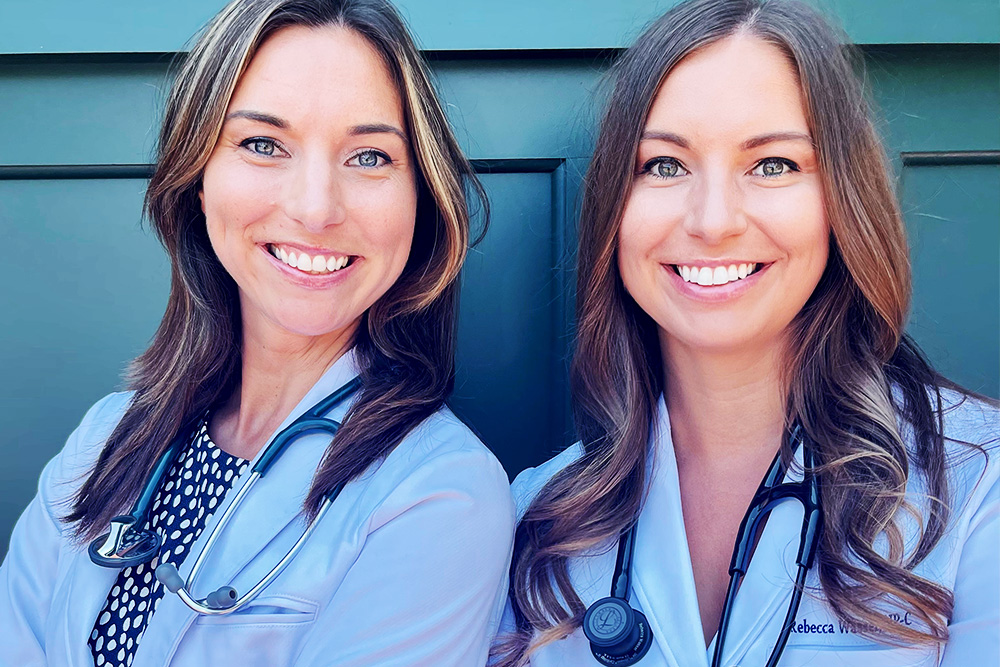
The 'Sisters' Clinic'
I got inspired to apply for autonomy when my mom texted me a Facebook post
"I’d like to impact patient care on my own terms."
alumna Sara Covall, a family NP who applied for autonomous practice in Virginia
about the deadline that just took place in Virginia July 1—funny, because I’d already been thinking a lot about it. It’s so important for NPs to grow professionally and truly practice at their full potential. I have a personal goal of one day opening my own clinic, which my sister and I have been talking about more seriously now that she’s also an NP. Within five or 10 years, we’ll be ready, especially with autonomy now on the table.
Right now, having autonomous practice doesn’t impact me day to day; I already practice autonomously, and go to my collaborating physician and nurse practitioner if I have a question or feel something’s out of my scope.
But I’d like to impact patient care on my own terms, and structure a clinic exactly the way I envision it, focusing in on prevention, making care access really easy, using technology, and removing any barriers that might keep patients from getting the care they need. Our clinic will offer the kind of comprehensive care model I saw at the federally qualified health center I worked at in Connecticut, with medical, dental, behavioral, chiropractic, and even podiatry together under one roof. It’d offer telehealth and virtual visits as well as longer appointments—say, 20-30 minutes for an exam or consultation, rather than the five to 10-minute appointments I’ve seen elsewhere.
It would also be community-based and built on the principles I recall when traveling with UVA’s Nursing Students Without Borders in El Salvador. Back then, we knew we couldn’t just be some nursing school from Virginia telling community members what they needed: to be sustainable, they had to inform its creation. It had to mean something to them, and it had to be theirs.
"I agree with physicians who say they’ve had more years of specialized education; that’s wonderful. That’s a strength. They certainly provide care on a different level in some areas of our healthcare system, and we need that, too. But we can all complement each other."
Alumna and NP Sara Covall
I think a lot about when Dean [Dorrie] Fontaine and the Compassionate Care Initiative talked to us about providers’ resilience. Autonomous practice would also help me structure what my work week would look like. Building in a little more independence would enable me to get that work-life balance, especially when my children—Max, who just turned four, and Claire, who’s two—are so young.
Do people know what a nurse practitioner is? More than they used to. When I do have to explain it, though, I mention how NPs really fill a gap in primary care and offer a little extra to the patient because we look at them as a whole. I get a lot of feedback from patients who tell me, “No one’s ever spent that much time with me.”
I had a patient once who was upset that he was seeing an NP for his care when he’d been under the impression he’d see a doctor. At the end of the exam, he told me, “No one has ever paid as much attention to me as you just did.”
Autonomous practice really won’t change how I practice nursing: I’m still going to practice within my scope, I’m still going to collaborate with healthcare teams, I’m still going to refer when appropriate. Research has shown that there are great outcomes with NPs’ care. In my mind, there’s no negative: It’s all about providing more access to care for patients.
 [read] Virginia Association of Nurse Practitioners' guidance on autonomous practice
[read] Virginia Association of Nurse Practitioners' guidance on autonomous practice
I agree with physicians who say they’ve had more years of specialized education; that’s wonderful. That’s a strength. They certainly provide care on a different level in some areas of our healthcare system, and we need that too. But we can all complement each other.
Over my eight years of offering primary care, I’ve gained a lot of confidence. When I get autonomy, I’ll probably print out the wallet size and put the larger certification in a frame in our home office. And then, maybe one day, I’ll hang it on the wall of my future practice, the sisters’ clinic.

